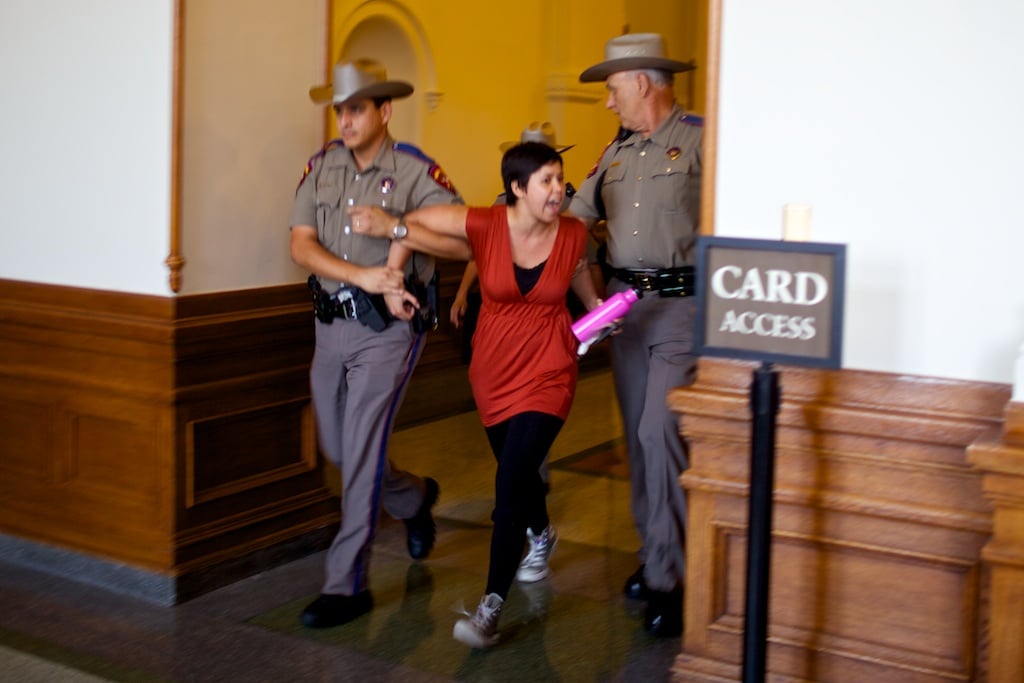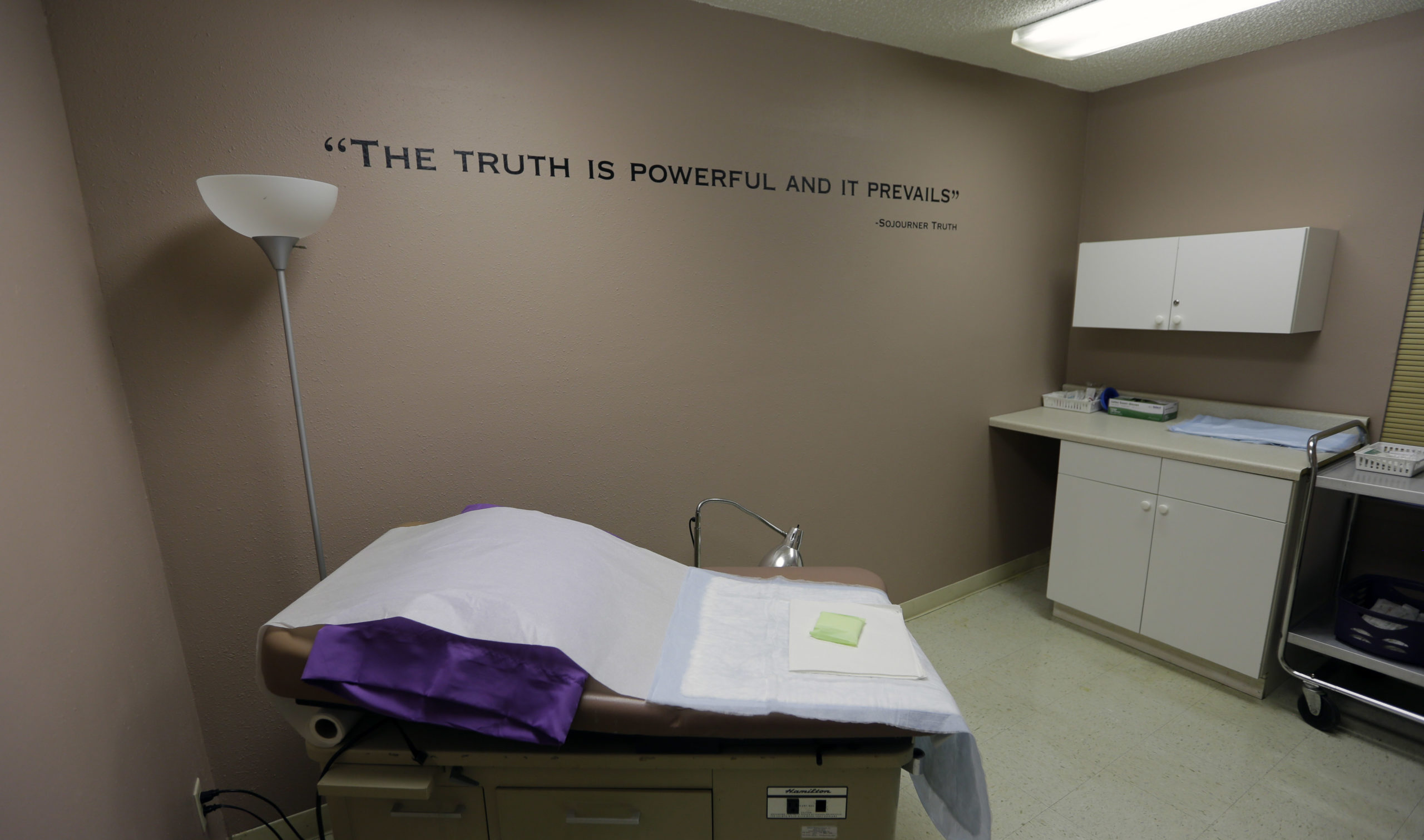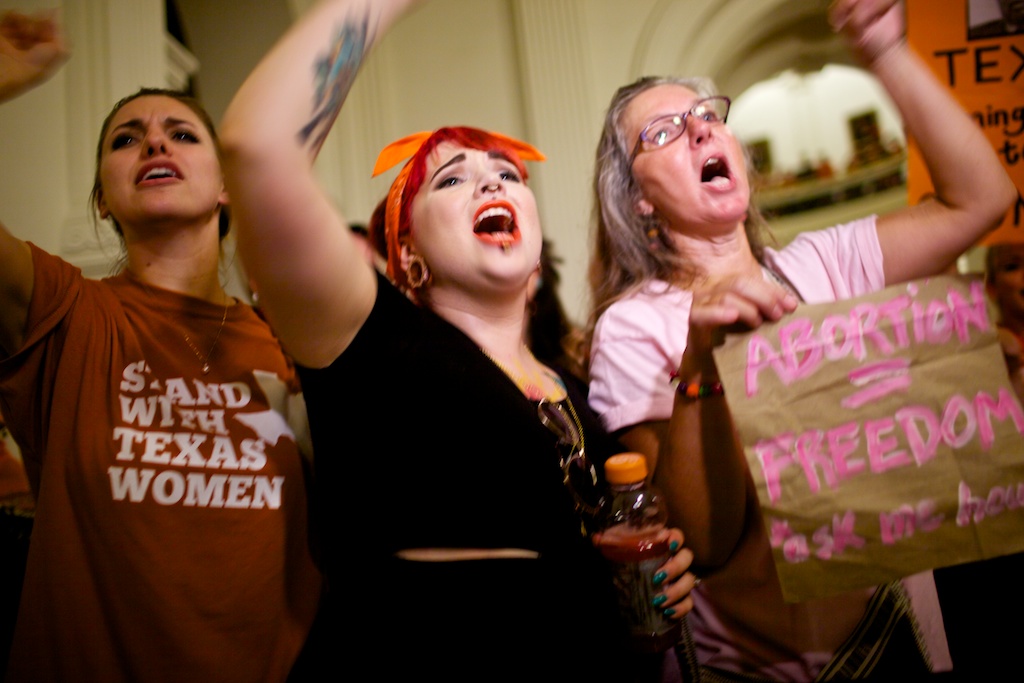
In House Bill 2 Trial, Pro-Lifers Can’t Lose

Above: Troopers lead a woman out the Capitol's east doors during a contentious debate on House Bill 2.
House Bill 2, the sweeping anti-abortion bill shuttering clinics around the state, emerged last summer from a paroxysm of legislative and popular uproar—some of the most unusual events the Capitol had ever seen. But now that the bill’s snaking its way through the courts, spontaneity has given over to a grim legal march that’s likely to hold few surprises until it—or a measure like it—goes before the Supreme Court, too late to stop the cull of abortion providers in the state. Even if the bill’s supporters ultimately lose their legal defense of the measure, they’ve won.
On Wednesday, the two sides made closing arguments in the second of two legal efforts to reverse parts of HB 2. The first, which took place last year, challenged provisions in the bill that toughened restrictions around medication abortions, and required doctors to get admitting privileges at nearby hospitals. In that case, U.S. District Court Judge Lee Yeakel sided partially with abortion providers, but his ruling was quickly overturned by the conservative Fifth Circuit.
This time, a legal team representing a group of abortion providers challenged different provisions of the law in the same court, arguing that the admitting privileges requirement and a separate stipulation that abortion facilities be built to the standards of a surgical center would eliminate access to abortion in wide swathes of the state. Clinics in the Rio Grande Valley and El Paso have been or will be shuttered, leaving Texans seeking abortion with the prospect of overnight trips to other parts of the state, or travel across state or national borders. The diminished access, the plaintiffs argued, would impose an unconstitutional “undue burden” on women seeking access to an abortion.
Yeakel seemed receptive to that argument—at times, he pushed the abortion providers’ attorney, Stephanie Toti, to go further. If it would be an undue burden for a poor woman seeking an abortion to travel 550 miles to abortion clinic, wouldn’t it also be an undue burden to travel 150 miles? Wouldn’t it be an undue burden even for a “wealthy woman in a Mercedes Benz who drives fast” if that woman had to take a day off work to get a medical procedure she could have received in her home town?
“I have a problem with believing that it’s reasonable to ask anyone to travel 150 miles to get medical care they could get closer to them,” Yeakel said. He pressed Toti: Was there any other medical procedure the state had limited access to so severely? Would it be acceptable to force someone to travel 150 miles to get treatment for a sprained ankle?
The state’s closing argument boiled down to a simple message to Yeakel: Your hands are tied. The Fifth Circuit ruling that overturned Yeakel’s decision, along with other Supreme Court rulings on abortion restrictions, left the judge with little discretion, argued Texas Solicitor General Jonathan Mitchell.
Mitchell seemed relaxed and comfortable as he made his closing argument: He was bowling with the bumpers on. Ignore the Fifth Circuit’s recent ruling, Mitchell argued, and the court would “issue a decision that will be overturned.” Yeakel can rule how he wants, but we know where the Fifth Circuit, overseen by hyper-conservative Supreme Court Justice Antonin Scalia, stands. Only the Supreme Court itself could sort out these concerns, and that will be some time away.
So unless the Fifth Circuit surprises just about everyone, the raft of abortion clinic regulations will go into effect on September 1, a little more than two weeks from now. Toti told the court that “less than seven” abortion clinics are fully in compliance with all parts of the new law: Ultimately, seven may be operating, all in major cities in the San Antonio-Houston-Dallas/Fort Worth triangle. Yeakel told the court that his opinion would be issued as soon as possible—but his ruling, if he chose to issue an injunction against parts of the law, could be itself overturned with equal speed.
Even if the matter is taken up by the Supreme Court and parts of the law are ultimately ruled unconstitutional, the bill will have done what supporters, like Lt. Governor David Dewhurst, promised it would: Gut access to legal abortion in Texas. A network of clinics and providers had been built up over time, and action by the Supreme Court, when and if it ultimately comes, can’t restore that. The legal challenges will continue to provide drama, but for pro-choicers, it’s a lose-lose.


